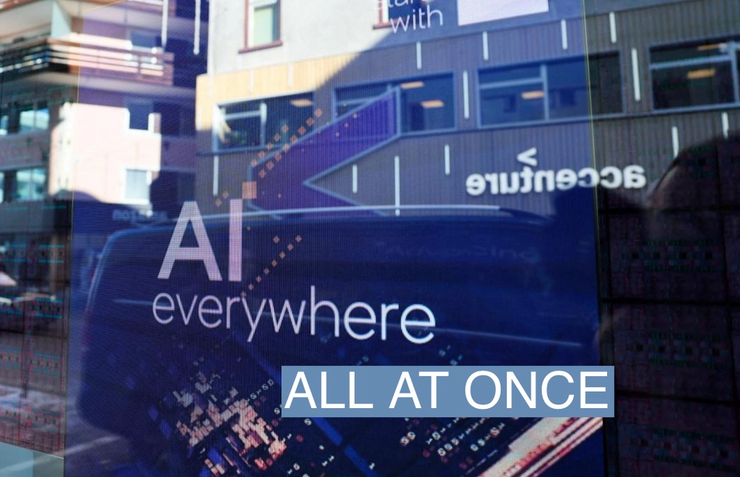The News
There’s a stretch of snow-covered road in Davos that seems to be mostly dedicated to large corporations marketing themselves to the global elite.
Outside, you might get a free hot chocolate. Inside, you’ll mostly hear about one topic: Artificial intelligence.
Everyone from Bill Gates, Diane von Furstenberg, or Wyclef Jean, has a view on what AI means for humanity and they’ve come to Davos to share it.
In one panel, hosted by Salesforce, Will.i.am of the Black Eyed Peas introduced the audience to the co-host of his new radio show: An AI chat bot. Zak Brown, the CEO of McLaren’s Formula 1 team, joked the bot might learn to drive a race car. And so in a way, AI has replaced crypto as the subject of this year’s silly tech craze.
In this article:
Reed’s view
But in slightly less glamorous venues, many of AI’s biggest luminaries — people who have been pioneering the technology going back nearly 50 years — were also using the unparalleled convening power of Davos to hash out some of the field’s most vexing questions.
In one panel, moderated by this reporter, two of the biggest voices on the subject of AI safety faced off from opposite sides of the debate. Yann LeCun, Meta’s chief scientist on AI and Max Tegmark, president of the Future of Life Institute, have been going at it on X. In person, they were more cordial, and possibly a bit more productive. “People who only know my conversations with Yann from Twitter probably don’t realize how much Yann and I actually agree on,” Tegmark said at one point. (They actually mostly disagree).
In another blockbuster panel, The Atlantic’s Nicholas Thompson interviewed some of the greatest minds in the industry about the limitations of AI today and how to break through. And in an Oxford style debate hosted by Politico, an audience was swayed in favor of closed source AI after initially supporting open source.
Davos gets flack for spotting bubbles and jumping on the hype train just as they’re about to pop. But last night, I watched Wyclef Jean practically lust after a generative AI tool he has used to create music. “These coders, they gotta be musicians,” he said.
Now that’s a use case.
Notable
- AI development is dependent on an energy breakthrough to power it, OpenAI’s CEO Sam Altman said at Davos.
- The International Monetary Fund thinks that nearly 40% of the world’s jobs could be affected by AI.
The View From

By Gina Mastantuono, Chief Financial Officer at ServiceNow
Let’s face it. The complex macro environment we find ourselves in today is going to persist, and yet I am optimistic it offers more promise than peril.
Disruption is par for the course. If the past few years have taught us anything, it’s that we must get comfortable with the uncomfortable. We must strive to be ready for whatever comes to ensure our talent, our assets, and our brands are safeguarded. This means building resilience into every corner of the business.
Those that do will thrive.
Every business is unique. As such, approaches will vary. But it starts with advocating for behavior and decisions that align to a shared vision and purpose – the tone starts at the top. Stay close to your customers and your people. Who are they and what do they expect from you?
Good governance is table stakes. A diverse set of skills, leadership, and experience are crucial. A strong degree of risk management can’t be underestimated – but it doesn’t mean being risk-averse.
Driving resilience is leaning into risk and innovation in a complex environment. It is a constant and delicate balancing act between disciplined spending and minimizing downside, while jumping on new opportunities and investing for growth.
In today’s world, embracing calculated risks and net-new innovation is the only way forward.
Discover how the ServiceNow Platform can help future-proof your business.


